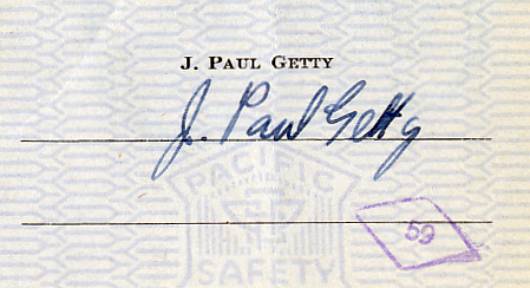Jean Paul Getty (December 15, 1892 – June 6, 1976) was an American industrialist and founder of the Getty Oil Company.
 Marriages
MarriagesGetty wrote a very successful book entitled How to be Rich. Note that it was not "How to get Rich." His oil business was handed to him by his father, who started the business.
Getty fully acknowledges this in his autobiography, I enjoyed the advantage of being born into an already-wealthy family, and when I began my business career I was subsidized by my father. While I did make money-and quite a bit of it-on my own, I doubt if there would be a 'Getty Empire' today if I had not taken over my father's thriving oil business after his death. (Getty, 1976, pg.336).
Views on His Own Success
Common ideas about Jean Paul Getty
It is true that Getty had a pay phone installed at Sutton Place manor. However, the reason behind it is fairly simple. In Getty's own autobiography (Getty, 1976, pg.319):
"Now, for months after Sutton Place was purchased, great numbers of people came in and out of the house. Some were visiting businessmen. Others were artisans or workmen engaged in renovation and refurbishing. Still others were tradesmen making deliveries of merchandise. Suddenly, the Sutton Place telephone bills began to soar. The reason was obvious. Each of the regular telephones in the house has direct access to outside lines and thus to long-distance and even overseas operators. All sorts of people were making the best of a rare opportunity. They were picking up Sutton Place phones and placing calls to girlfriends in Geneva or Georgia and to aunts, uncles and third cousins twice-removed in Caracas and Cape Town. The costs of their friendly chats were, of course, charged to the Sutton Place bill."
Hence, the only solution was to place dial-locks on all the regular telephones, limiting their use to authorised staff, and the coin-box telephone was installed for others. However, when speaking in a televised interview with Alan Whicker, Getty simply explained it by saying that he thought guests would want to use a payphone.
 Coin-box Telephone
Coin-box TelephoneAt age 16, on 10 July 1973 in Rome, John Paul Getty III was kidnapped and a ransom of $17 million was demanded over the phone for his safe return. As Paul III was so rebellious, when the first ransom message arrived, the family suspected a ploy by the teenager to extract money from his miserly grandfather. A second demand was delayed by an Italian postal strike. Paul III was permanently affected by the trauma, and himself became a drug addict. In 1981, Paul III was rendered speechless, blind and paralyzed for the rest of his life by a cocktail of drugs and alcohol.
J Paul Getty defended his initial refusal to pay the ransom on two points. Firstly he argued that he had fourteen other grandchildren, and to submit to the kidnappers' demands would immediately place his other fourteen grandchildren at the risk of copy-cat kidnappers.
Secondly: "The second reason for my refusal was much broader-based. I contend that acceding to the demands of criminals and terrorists merely guarantees the continuing increase and spread of lawlessness, violence and such outrages as terror-bombings, 'skyjackings' and the slaughter of hostages that plague our present-day world" (Getty, 1976, pg.139).
Published works
Getty Center and J. Paul Getty Museum
No comments:
Post a Comment